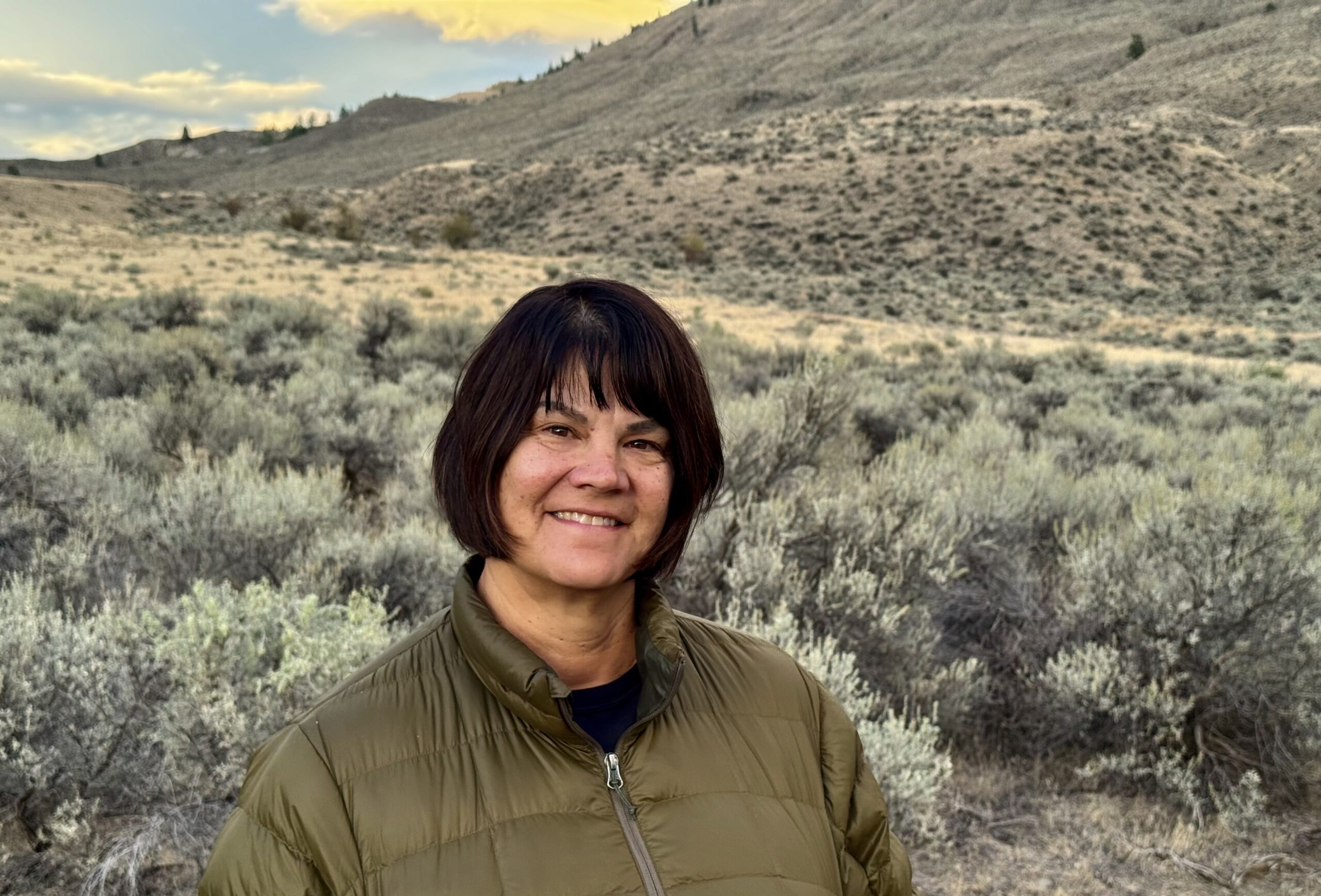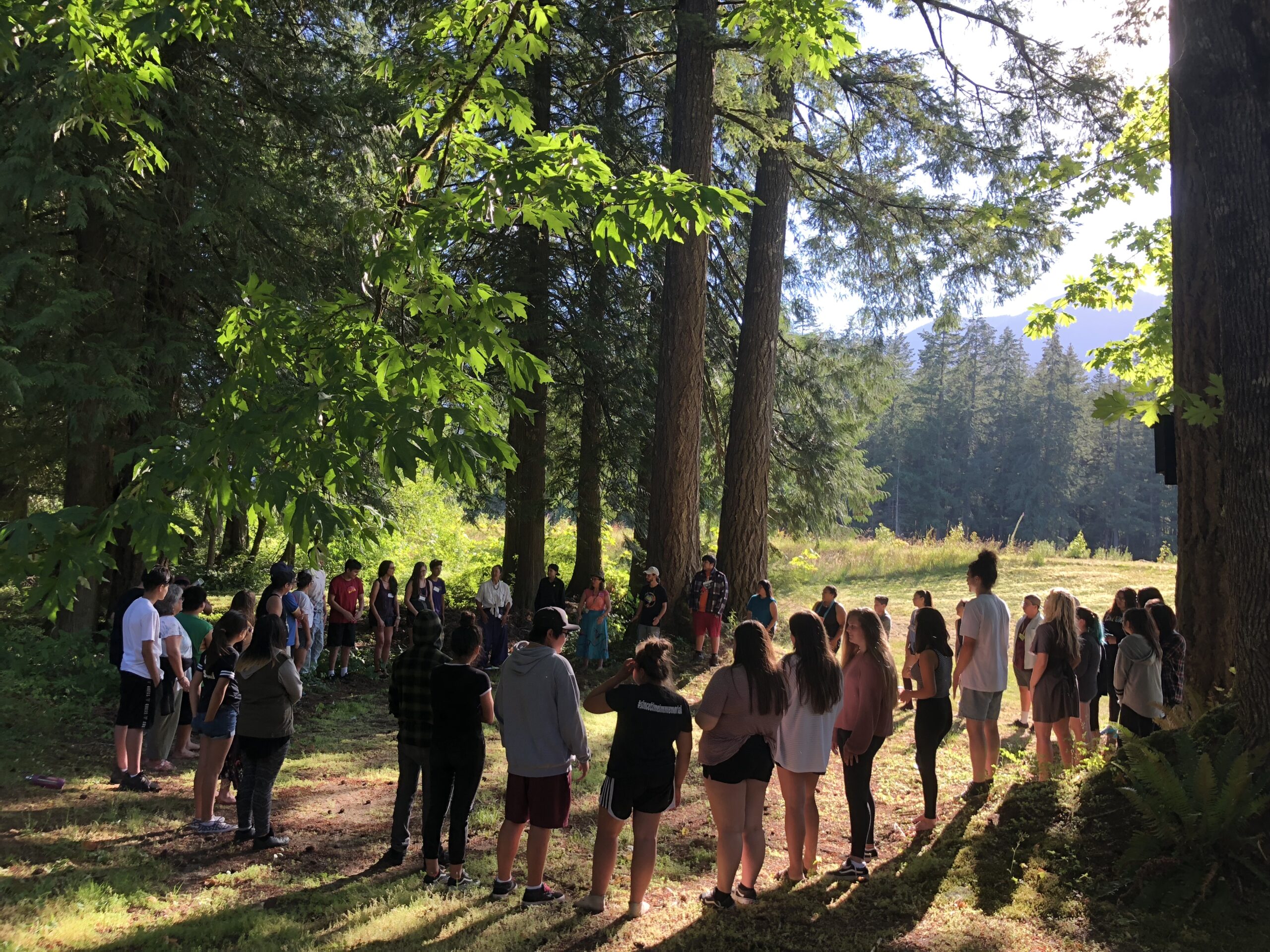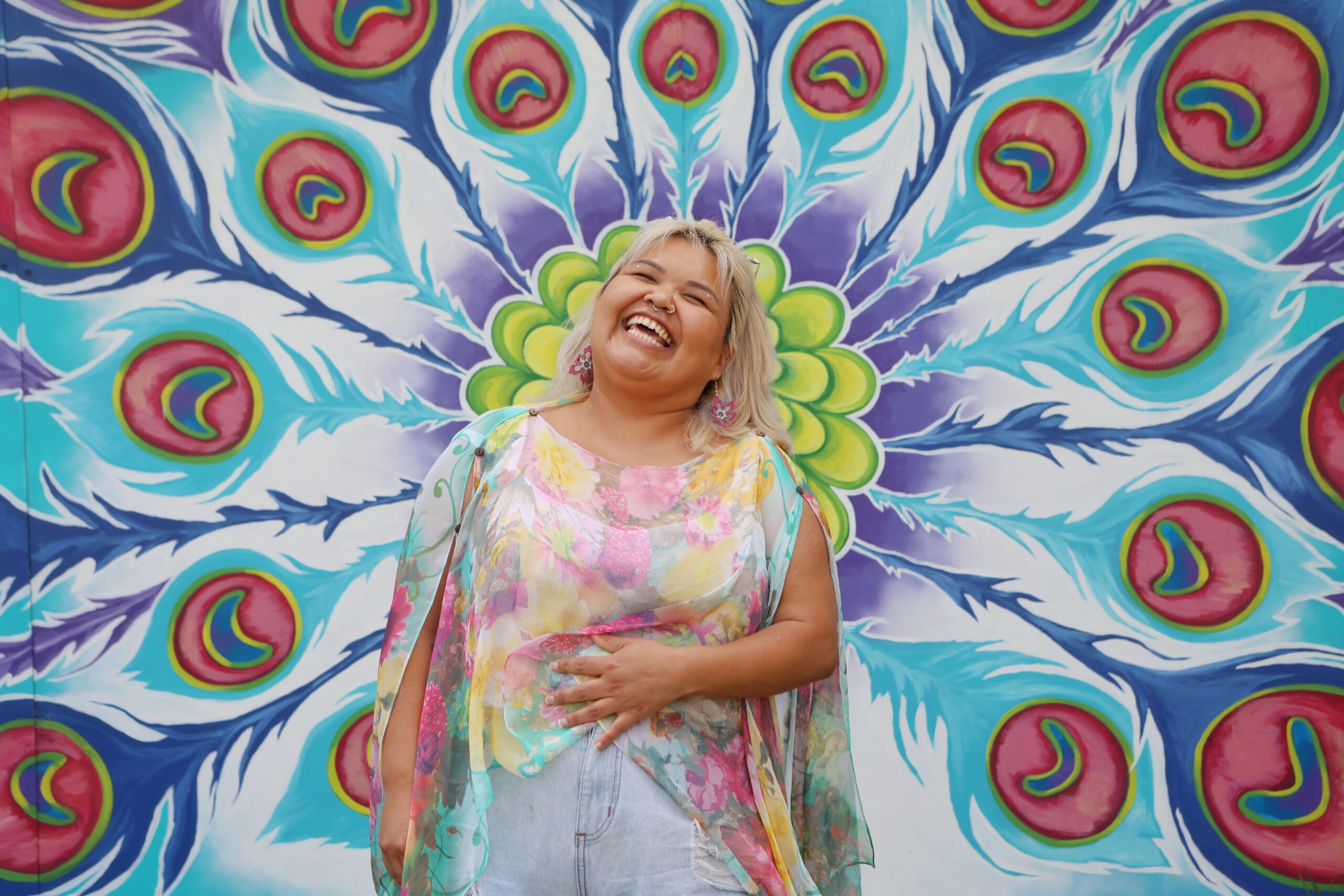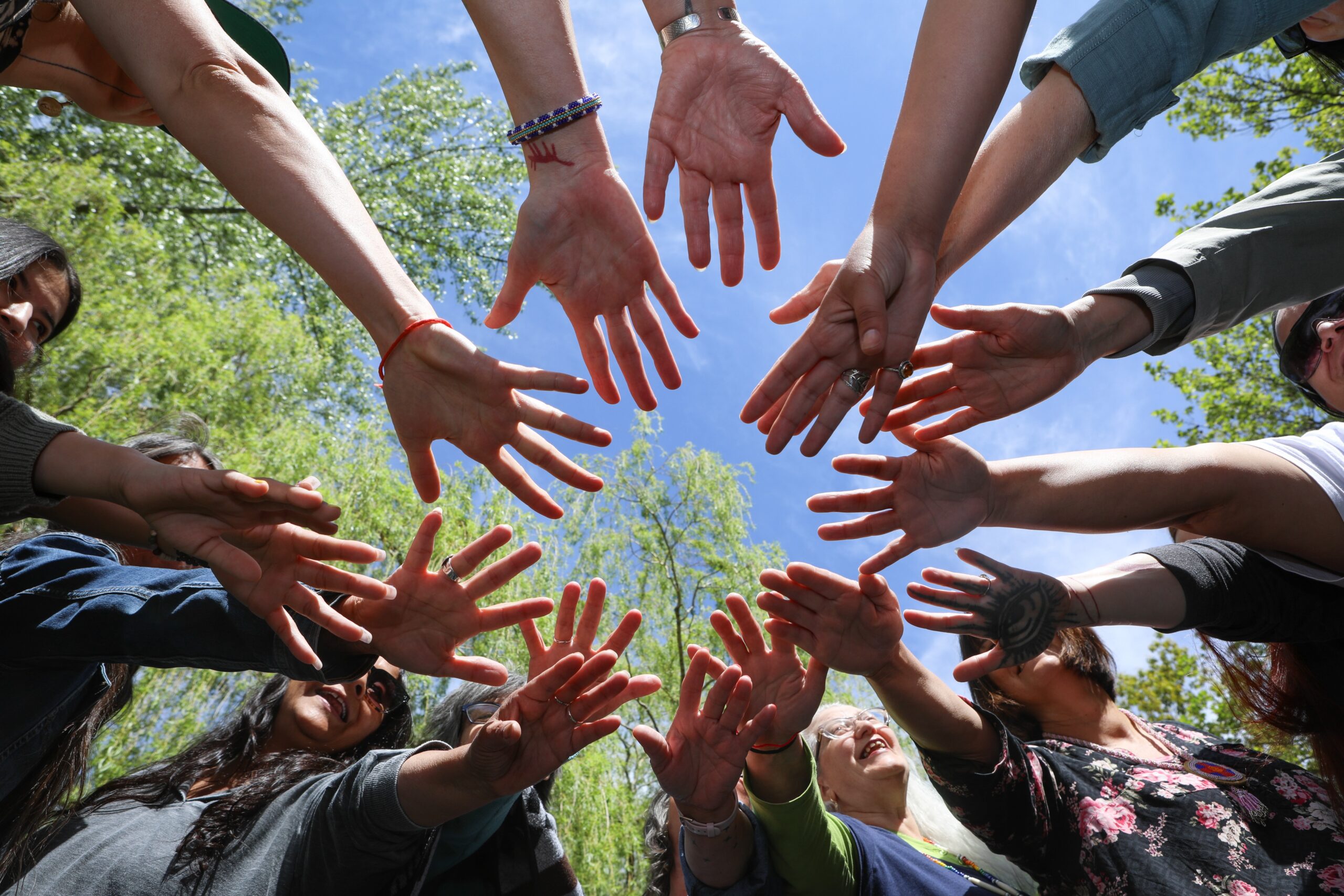In nsyilxcən, the language of the syilx Okanagan people, Kelly Terbasket’s last name describes the process of unravelling or pulling apart a ball of tangled sinew or string. “That’s totally what I see as a metaphor for the work we’re doing,” she says.
Kelly is the director and co-founder of IndigenEYEZ, a project on MakeWay’s shared platform that offers leadership and facilitation training grounded in Indigenous ways of being. It supports youth and community champions in the work of unravelling colonial harms and reweaving cultural pride, wellbeing, relationships, and kinship networks.
This fall, Kelly and IndigenEYEZ are preparing for the launch of ReSTORY, a new certificate program in community restoration. “Restoration is about restoring the fabric of our communities—restoring those relationships between aunties and uncles and grandparents, those natural champions in our community.”
Through years of working in First Nations communities, Kelly gained firsthand insight into some of the unique challenges that can arise in community work, such as resource scarcity, burnout, and the impacts of trauma.
The program responds to these challenges by guiding emerging Indigenous leaders through self-reflection while supporting them to develop skills to build strong relationships, handle conflict, and work in healthy, sustainable ways.
Growing up in two worlds
Kelly is of mixed ancestry. Her late father was syilx, and her mother is a fifth-generation settler with mixed European heritage. For many generations, her family has ranched, farmed, and maintained orchards in the Similkameen Valley, in south-central British Columbia, on the traditional territory of the smelqmix People of the syilx Okanagan Nation.
Kelly grew up with her feet in two worlds after her parents separated when she was five years old. She went back and forth between living with her settler family and her syilx family—not feeling like she fully belonged in either.
“I never fit in completely to either family or culture,” she remembers. She also observed differences between the two. “I felt the divide—the tension of the differences. I saw the lived realities, and the differences in the lived realities, of the two families.”
Kelly remembers hearing racist comments while spending time in her settler community in the 1970s and 1980s. She also noticed how her Indigenous family members kept their distance from settlers for safety. There was closeness and connection in her syilx family, but they also carried the weight of multi-generational trauma: “struggles on so many levels, and so much pain.”

“It needs to be better for our youth”
Kelly pursued a career supporting Indigenous youth. She recalls thinking, “I don’t want youth to go through what I’ve just gone through. It needs to be better for our youth.”
She spent many years working with Health Canada to deliver a community-based early intervention program for Indigenous preschool children, traveling to over 100 First Nations communities. These experiences inspired her vision for IndigenEYEZ.
“It exposed me to the realities and the needs of our communities and the foundational gaps that are not addressed or focused on in current programming,” Kelly says. “That’s where the dream and vision started—going to all those communities.”
When her two children were grown, Kelly decided it was time to take a risk: she left the federal government and started a consulting business to provide leadership training, coaching, and strategic planning services to First Nations.
Starting her own consulting company was a big step towards the work she felt called to do, but it wasn’t until she learned about the arts-based community empowerment model of Partners for Youth Empowerment (PYE) that things really fell into place. She wanted to use PYE’s method to uplift Indigenous youth and communities—it just needed to be Indigenized.
The start of IndigenEYEZ
In 2013, Kelly partnered with another Indigenous woman, Kim Haxton, to bring arts-based youth empowerment to Indigenous communities through camp experiences. Haxton had been delivering land-based education and leadership training for more than a decade.
Working directly with youth was new to Kelly, and before she felt ready to commit, she sent her daughter to a camp to experience its value firsthand.
“I couldn’t believe the transformation that happened in seven days,” she recalls. “[The camp] was foundational to her life, confidence building, identity clarity, loving herself and others…” Encouraged by her daughter’s positive experience, Kelly felt ready to take the leap.
Kim received the name “IndigenEYEZ” in ceremony. “The meaning of it was one eye forward, one eye back,” Kelly explains. “It means honouring our ancestors but also looking to the future for the people-to-be.”
When Kelly began developing IndigenEYEZ programming, she knew she needed to find a home for it within an existing charitable organization. “I didn’t want to do all the work of having to get my own charity status or figure out how to do bookwork. All of those things make me want to run in the other direction! I knew I wanted to be part of an existing organization to get started.”
IndigenEYEZ became a project on MakeWay’s shared platform, which provides a suite of operational and strategic supports to over 60 environmental and social initiatives. The project has remained on the platform since 2013. “It’s working,” Kelly says, “it’s so supportive in so many ways that we haven’t needed to start our own nonprofit.”
Broadening the circle around youth
For nearly a decade, IndigenEYEZ organized a large annual camp, along with occasional weekend camps and leadership training sessions.
The camps were inspiring. Youth participants showed incredible curiosity, enthusiasm, and growth over the course of a single week. But having one transformative experience wasn’t enough, shares Kelly.
“We recognized that we needed to use a fundamentally Indigenous approach. We needed to include the parents, community members, and youth workers,” she explains. “They also needed to be empowered in order to strengthen the web around the youth.”

In 2020, IndigenEYEZ pivoted and began offering workshops and training for adults, introducing new courses such as Creative Facilitation and 13 Moons, a leadership program for Indigenous women. The project also began offering reconciliation workshops through a sister social enterprise, KinSHIFT. Over 10,000 people have now participated in courses and training.
Travis Klemp, who supports Indigenous projects on MakeWay’s shared platform, says the courses are unique and deeply moving. “IndigenEYEZ offers the opportunity to connect with culture and ways of working that can open participants’ minds.”
This year, Travis has had the privilege of working closely with Kelly and the project, supporting its goals and helping to build new partnerships. He feels grateful for the opportunity to learn from Kelly and to be inspired by the project’s work.
“Kelly carefully and meaningfully creates spaces for entering into relationship. She shares herself and her experience in a way that everyone should strive towards—an authenticity and reciprocity that is rooted in Indigeneity.”
“Igniting hope for new possibilities”
Despite the growing popularity and success of IndigenEYEZ, Kelly felt that it was missing something. Courses focused on leadership and facilitation skills, but they did not include enough space for self-reflection—something that Kelly says is key to a cultural approach.
This gap, along with Kelly’s own academic research into the characteristics of syilx leadership, led to the creation of the new certificate program in community restoration: reSTORY.
ReSTORY consists of 4 micro-credentials, with the Four Food Chiefs as a framework: Chief Skəmixst (Black Bear), Chief Ntyxtix (Spring Salmon), Chief Spʼiƛ̕əm (Bitter Root), and Chief siyaʔ (Saskatoon Berry). The Four Food Chiefs are part of the syilx creation story, and offer lessons about balancing our unique characteristics, strengths, weaknesses, and roles.
With the Four Food Chiefs as a guide, reSTORY participants gain skills that help them respond to the unique challenges faced by those working in First Nations communities, and they start by looking at the impacts of colonization.
“We need to start by understanding how colonization has impacted us—and continues to today,” says Kelly. “The reSTORY program shares skills for restoring what colonization tried to break—the relationships that hold us together.”

Participants learn how to build trust, navigate conflict, foster healthy communication, create safe spaces, and bridge differences. But it’s not just about skills and tools, Kelly explains—it’s also about looking inwards.
“It’s about having techniques and skills and courage. You can’t just get a technique and then go implement it; it takes courage to do things differently. And that’s inner work.”
Although the program is grounded in syilx teachings, it is open to all Indigenous people. “The syilx rooted model and teachings are meant to be an inspiration and a conduit for participants to seek out their own teachings and root themselves in their own identity, their own people’s wisdom.”
Once participants complete all four micro-credentials, they receive a certificate in community restoration.
For Kelly, decades of personal growth, cultural learning, and meaningful work have led to this moment, and it comes with a deep sense of purpose and pride. “I have a lot of trust that this is what I am meant to offer,” she says.
She’s eager to welcome the program’s first participants in October 2025 and see the transformations that reSTORY can bring.
“My hope is that we begin to see people build trust, confidence and courage to have difficult conversations, bring our methodologies and practices into their spaces, and notice a shift—because once you start noticing a shift, you have more hope. And to me, the foundation of this work is about igniting hope for new possibilities going forward. We really need that right now.”
ReStory begins October 2, 2025. To learn more about the program and other IndigenEYEZ courses, visit indigeneyez.com.
Cover photo by Aaron Hemmens.
